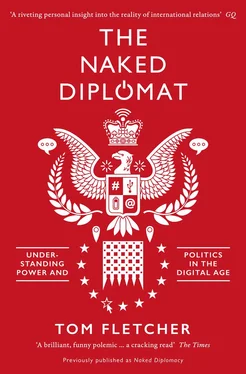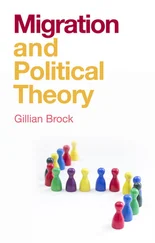Diplomacy is easy when you have won on the battlefield. Your rivals or opponents are more inclined to see things your way, and your allies to cut you some slack. You can flex your muscles and set the terms.
Diplomacy is easy when your people are in a pioneering mindset. The diplomats who manage empires aren’t the people who build them. They are preceded by traders, explorers, innovators. The great civilisations were all built on great start-ups. Countries succeed when they have a magnetic quality, and an openness to the world around them: when they invest more in bridges than walls. When their world view is formed by having actually viewed the world.
Diplomacy is easy when the rules are clear, when nations are all playing on the same chess board. The subtle dance between the nineteenth century’s great European states had moments of great jeopardy, and in the end could not contain the shifts in the underlying tectonics of power. But, post-Napoleon, the key players all felt a shared interest in preserving a status quo. They spoke the same language, literally and metaphorically – they even ensured with touching but shrewd generosity that it was the language of the vanquished party. There was an elaborate code to their collective work, albeit surrounded by lashings of protocol, gallons of alcohol, fiendishly delicate etiquette, and the occasional deadly duel.
But diplomacy is hard when you are a nation or a region in real or perceived decline, when it becomes more difficult to get that White House meeting, or to schedule that telephone call. Or when your ‘podiums and president’ press conference is downgraded to a brief ‘pool spray’ photo-op. Or worse, a ‘grip and grin’. When the eyes of the world’s leaders flicker over your shoulder at the more hungry or vigorous new powers on the block.
Diplomacy is hard when your military power is on the wane, either because austerity is biting, or because your citizens are less willing to make great sacrifices to impose the nation’s interests, extend its influence or intimidate its opponents. ‘Gunboat diplomacy’ does not get you far without a gunboat. Or aircraft carrier. Threats of military force lose their potency when the dictator being threatened knows that your red lines *are easily erased.
Diplomacy is hard when you are competing with players with greater pioneering zeal, when your nation loses its creative edge or hunger for innovation. Diplomacy is hard when a lack of resources or confidence leads to an introspective national mindset rather than a drive to find new ideas, markets and sources of renewal. When your agenda is set by demagogues and tabloids. When even some on your own side want to throw in the towel and decline quietly and unobtrusively in a corner. When visitors to your embassy or ministry smell the faint whiff of genteel decay.
Diplomacy is hard is when the rules of the game are in flux, when there are players willing to turn the chess board over, when the international system is being disrupted from outside, or degraded from within. It is hard when tyrants and terrorists, pirates and persecutors, are setting the agenda. Diplomacy is hard in the periods when rival sources of power think that diplomacy doesn’t matter.
Yet the periods when diplomacy is hardest are also the periods when it matters most.
Much of the West is therefore in a phase of hard diplomacy. Diplomacy that wears out the soles of your shoes, runs up the air miles and telephone bills, forces you to innovate and adapt. During such periods of change and peril, we don’t need diplomats who arrive on a yak when the opposition has been and gone by horse.
Those who want to hammer the last nails into the coffin of diplomacy fall into three camps: diplomats no longer represent anything; diplomacy has been disrupted by technology; diplomacy has failed.
There are elements of truth in each of these arguments. If Google is more important than many states, is it not more important to be a Google ambassador than a national one? Aren’t diplomats simply courtiers, moving between hierarchies without recognising they are part of the past? Can’t diplomats be replaced by sentiment analysts with Skype accounts? If diplomats did not exist, why would we need to invent them in the twenty-first century?
Diplomacy does indeed face a crisis of legitimacy and trust.
Traditionally, representation was the main point of diplomats. 2If you were your prince’s person in a rival court, it mattered less what you did than what you were: the symbol of power and prestige. An ambassador’s legitimacy and power depended on the support of a small number of people in his ruling elite, sometimes just one.
In the era of growing democracy in the West – the last 200 years or so – that elite grew, but not dramatically. A British ambassador making pre-posting calls, getting his marching orders, would not need to step outside Westminster.
When states become weaker, so do those who represent and derive authority from them. As the trend continues towards global decision-making for the big global issues on the one hand, and greater localisation and individualisation on the other, where does a state’s representative fit in?
But the reality is that governments and states are not finished yet. Although they no longer have overwhelming dominance of information or even knowledge, they do remain the means through which questions of national interest are determined. As long as we have states, we will still need diplomats to mediate between them. They still have a niche.
So diplomats will need to redefine their legitimacy, and reconnect to the new sources of power. I was proud to be Her Majesty’s Ambassador in Lebanon, and put the letter saying so on the wall. But I also felt that I was Her Majesty’s Government ’s Ambassador. And even the Ambassador of the British People. When there were monarchies, diplomats represented kings and queens. When there were great states, they represented great states. Now, with the dispersal of power, can they more credibly claim to represent the people of their countries?
We don’t yet know whether people will respond to the threats of the twenty-first century with more nationalism or less. Diplomats who derive their legitimacy solely from states must secretly hope for the former. Diplomats who see themselves as embodying something more must hope for the latter.
The role of diplomats is being transformed faster than at any point in history. But no one has come up with a better idea. Diplomacy existed before states, and will exist after they have ceased to be the principal form of geographical power. We are in uncharted waters – but we always have been. This book will try to make the case for diplomats to remain on the boat.
The second critique also has elements of truth. Diplomacy does indeed face disruption, by technology, and by others who can do diplomacy more effectively. Being in office no longer means being in power.
Digital technology will transform the way that governments engage with citizens. But while the Internet defies boundaries, most governments find it hard to escape the confines of national responses. Data is not sufficiently shared and regulation struggles to keep pace. 3Governments have not yet tackled the big questions on the balance between privacy and transparency, or found the right formula to nurture innovation.
Who disrupts diplomacy? Many analysts, businesses, commentators are already well under way.
Traditionally, diplomats divided their rivals into three groups. First, the obviously hostile, such as great power rivals or aggressor states. In periods such as the run-up to the Congress of Vienna or the Cold War, this was straightforward and neat. We had clear enemies, definable nemeses. You could chart them on a map. You could kill them in a Bond film.
Читать дальше












